| Listing 1 - 10 of 13 | << page >> |
Sort by
|
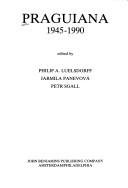
ISSN: 01657712 ISBN: 9027215499 1556192657 9786613327970 9027276641 128332797X 9789027215499 9789027276643 9781556192654 Year: 1994 Volume: v. 40 Publisher: Amsterdam Benjamins
Abstract | Keywords | Export | Availability | Bookmark
 Loading...
Loading...Choose an application
- Reference Manager
- EndNote
- RefWorks (Direct export to RefWorks)
The aim of this volume is to witness how the activities of the Prague School have continued to bring important new insights and discussions between the 1940's and the present time. Contributions are included which have escaped attention on an international scale because they were published in Czech; several papers have been written especially for this volume. The contributions cover various domains: syntax, morphology, sociolinguistics, graphemics, the language system, the lexicon, and contrastive linguistics.
Structural linguistics --- Prazsky linguisticky krouzek --- Structural linguistics. --- Linguistics [Structural ] --- Linguistique structurale --- Linguïstiek [Structurele ] --- Structurele linguïstiek --- Structurele taalwetenschap --- Taalwetenschap [Structurele ] --- Linguistics --- Prague Linguistic Circle --- Linguistic Circle, Prague --- Linguistický kroužek (Prague, Czechoslovakia) --- Cercle linguistique, Prague --- C.L.P. (Cercle linguistique, Prague) --- Prazhskiĭ lingvisticheskiĭ kruzhok --- CLP (Cercle linguistique, Prague) --- Prague School --- Prague (Czechoslovakia). --- Circolo linguistico di Praga --- Scuola di Praga --- Pražský linguistický kroužek.
Book
ISBN: 0262285061 0585373078 9780585373072 9780262285063 Year: 1995 Publisher: Cambridge, Mass. MIT Press
Abstract | Keywords | Export | Availability | Bookmark
 Loading...
Loading...Choose an application
- Reference Manager
- EndNote
- RefWorks (Direct export to RefWorks)
Driven by a common desire to form a new basis for understanding the sources and functioning of language, a heterogeneous group of Czech, Russian, Ukrainian, and German scholars who found themselves living in Prague in the mid 1920's created the profoundly influential Prague Linguistic Circle. This book examines the historical factors that produced the Circle, the basic tenets that it promulgated, and, most important, the social and cultural environment in which it flourished. The book can also be read as an interlocking series of intellectual biographies of the Prague Circle's major figures. The new linguistics, whose core was to be phonology, emphasized synchronic analysis, anti-psychologism, anti-causalism, the investigation of language contact, and the understanding of language as a social institution. Significantly, the Circle's theories were strongly connected to and reflected by Prague's literary and artistic avant-garde. The book is based on extensive archival research in Czech, Russian, and German sources. Jindrich Toman is especially adept at showing how characteristics of the spirit of the age, such as the ideal of collective activity, the idea of a synthesis of knowledge, and an emphasis on a socially defined commitment to scholarship, became embedded in the Prague Circle's program. It was Roman Jakobson, the best-known member, who broadcast the Circle's activities to a wider world; however, Toman also focuses on several of Jakobson's colleagues who deserve equal appreciation - in particular the Russian prince and phonologist N.S. Trubetzkoy and the Czech professor of English and academic reformer Vilem Mathesius.
Pražský linguistický kroužek. --- Prague Linguistic Circle --- Linguistic Circle, Prague --- Linguistický kroužek (Prague, Czechoslovakia) --- Cercle linguistique, Prague --- C.L.P. (Cercle linguistique, Prague) --- Prazhskiĭ lingvisticheskiĭ kruzhok --- CLP (Cercle linguistique, Prague) --- Prague School --- Prague (Czechoslovakia). --- Circolo linguistico di Praga --- Scuola di Praga
Book
ISBN: 3862347044 389971704X Year: 2010 Publisher: Vandenhoeck & Ruprecht
Abstract | Keywords | Export | Availability | Bookmark
 Loading...
Loading...Choose an application
- Reference Manager
- EndNote
- RefWorks (Direct export to RefWorks)
Diese Reihe untersucht Gemeinsamkeiten und Unterschiede von Natur- und Geisteswissenschaftlichen. Das Konzept des »Einflusses« bzw. des »gegenseitigen Einflusses« soll zugunsten eines dynamischeren Konzepts des »Interfacing« (Verbindung/Vernetzung) hinterfragt werden. Ein grundlegender Ausgangspunkt ist die Erkenntnis, dass die beiden Wissenssphären, die geistes- und die naturwissenschaftliche, häufig zur gleichen Zeit neue Untersuchungsmodelle entwickeln und damit auf komplexe wissenschaftliche und kulturelle Phänomene reagieren. Das Konzept des »Interfacing« impliziert eine integrierte Sicht neuer Wissensgebiete in neuen Kontexten. Nicht länger an der traditionellen Vorstellung von »Ursache und Wirkung« gebunden, impliziert der Isomorphismus Gleichzeitigkeit statt Konsequentialität. Nicht immer beeinflusst die eine Sphäre die andere; Isomorphismus impliziert gemeinsame Entdeckungen, durch die beide Bereichen zur gleichen Zeit neue investigative Modelle und Darstellungssysteme entwickeln. Dialog und gegenseitiges Verständnis zwischen den beiden sogenannten »zwei Kulturen« werden so stimuliert. Wichtige Forschungsbereiche sind Interfacing-Modelle und Paradigmen in den Natur- und Geisteswissenschaften, kulturell bedingte Darstellungen von Naturwissenschaft und Technologie, wissenschaftliche Entdeckungen und narrative Diskurse, Lebenserinnerungen von Wissenschaftlerinnen und Wissenschaftlern, das Überschreiten von Grenzen zwischen Natur- und Geisteswissenschaft durch Lernen sowie die Bereicherung der Geisteswissenschaften durch angewandte Naturwissenschaften, einschließlich der Informationstechnologien. Die Reihe umfasst sowohl Monographien als auch Essaysammlungen in englischer, deutscher, französischer und italienischer Sprache. Das Nebeneinander verschiedener Sprachen zeugt von der Intention von Herausgeberschaft und wissenschaftlichem Beirats, ein integriertes Wissen aus europäischer Perspektive herauszubilden.
Language Arts & Disciplines / Linguistics --- Language arts --- Communication arts --- Communication --- Study and teaching --- Pražský linguistický kroužek. --- Prague Linguistic Circle --- Linguistic Circle, Prague --- Linguistický kroužek (Prague, Czechoslovakia) --- Cercle linguistique, Prague --- C.L.P. (Cercle linguistique, Prague) --- Prazhskiĭ lingvisticheskiĭ kruzhok --- CLP (Cercle linguistique, Prague) --- Prague School --- Prague (Czechoslovakia). --- Circolo linguistico di Praga --- Scuola di Praga --- Language Arts & Disciplines --- Linguistics --- General
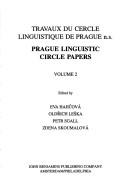
ISBN: 9027254443 9027254427 9789027254429 1556196733 9781556196737 9789027254443 9786613358448 1283358441 9027276129 158811175X 9786612161506 1282161504 902729688X 9789027296887 9789027276124 9781283358446 6613358444 Year: 2002 Volume: 4 Publisher: Amsterdam John Benjamins Publ. Co.
Abstract | Keywords | Export | Availability | Bookmark
 Loading...
Loading...Choose an application
- Reference Manager
- EndNote
- RefWorks (Direct export to RefWorks)
The fourth volume of the revived series of "Travaux du Cercle linguistique de Prague" brings three contributions (by J. Vachek, O. Leka and V. Skalička) connected with the classical period of the Prague School, as well as papers delivered at the conference "Function, Form, and Meaning: Bridges and Interfaces", held in Prague in 1998. Some of the contributions concern issues of grammar of different languages including a syntactic annotation of a large Czech text corpus, a comparison of Hebrew conditionals with English, a characterization of the typology of the Indo-European verb. A further part focuses on topic-focus articulation (information sentence structure, functional sentence perspective), with a concept of 'perspective' introduced as close to but distinct from 'topic' and with three different viewpoints on the semantics of information structure. Two broader essays on the nature of language are then presented, while the last section analyzes the structure of free verse. The volume represents a contribution to the continuing fruitful interaction between the work of the Prague School and the more and less closely related approaches of linguists in other countries.
Structural linguistics. --- Functionalism (Linguistics) --- Functional analysis (Linguistics) --- Functional grammar --- Functional linguistics --- Functional-structural analysis (Linguistics) --- Grammar, Functional --- Grammatical functions --- Linguistics --- Structural linguistics --- Prazsky linguisticky krouzek. --- Prague Linguistic Circle --- Linguistic Circle, Prague --- Linguistický kroužek (Prague, Czechoslovakia) --- Cercle linguistique, Prague --- C.L.P. (Cercle linguistique, Prague) --- Prazhskiĭ lingvisticheskiĭ kruzhok --- CLP (Cercle linguistique, Prague) --- Prague School --- Prague (Czechoslovakia). --- Circolo linguistico di Praga --- Scuola di Praga --- Pražský linguistický kroužek.

ISBN: 9027296545 9786612255380 1423761006 128225538X 9781423761006 9789027296542 1588113787 9027215596 9789027215598 9781588113788 6612255382 Year: 2003 Publisher: Amsterdam Philadelphia John Benjamins Pub. Co.
Abstract | Keywords | Export | Availability | Bookmark
 Loading...
Loading...Choose an application
- Reference Manager
- EndNote
- RefWorks (Direct export to RefWorks)
This is the first English version of a text out of print for more than 40 years, summarising the positions and key concepts of an influential stream of linguistic thought. Using quotations as entries, J. Vachek (1909-1997), a leading advocate of the Prague School, employed more than 160 sources, papers and monographs, by well over 30 representatives of the school (Mathesius, Trnka, Skalička, Daneš, Dokulil, Mukařovský, Jakobson, Trubetzkoy, Isachenko, and others). The dictionary both captures the pioneering efforts and achievements of the school from its foundation in 1926, and provides a framework for assessing the current state of affairs, attesting to its originality and serving as a preventive to treading paths already explored. The headword concepts are provided with French, German and Czech equivalents and Vachek's original preface is supplemented by a foreword which traces the development of the school up to the present date and puts it into perspective.
Linguistics. --- Linguistic science --- Science of language --- Language and languages --- Pražský linguistický kroužek --- Prague Linguistic Circle --- Linguistic Circle, Prague --- Linguistický kroužek (Prague, Czechoslovakia) --- Cercle linguistique, Prague --- C.L.P. (Cercle linguistique, Prague) --- Prazhskiĭ lingvisticheskiĭ kruzhok --- CLP (Cercle linguistique, Prague) --- Prague School --- Prague (Czechoslovakia). --- Circolo linguistico di Praga --- Scuola di Praga --- #KVHA:Linguistiek. Woordenboeken; verklarende --- 800 <03> --- 800 <03> Taalwetenschap. Taalkunde. Linguistiek--Naslagwerken. Referentiewerken --- Taalwetenschap. Taalkunde. Linguistiek--Naslagwerken. Referentiewerken --- Lingüística estructural --- -Linguistic science --- Diccionarios --- Prazsky linguisticky krouzek --- Dictionaries --- -Diccionarios
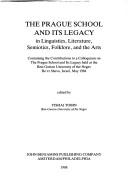
ISBN: 1283328356 9786613328359 9027278679 9789027278678 9027215324 9789027215321 9027215375 9789027215376 Year: 1988 Volume: 27 Publisher: Amsterdam
Abstract | Keywords | Export | Availability | Bookmark
 Loading...
Loading...Choose an application
- Reference Manager
- EndNote
- RefWorks (Direct export to RefWorks)
Many of the fundamental ideas of the classical Prague School have guided or inspired much of the interdisciplinary post World War II research in linguistics, literary theory, semiotics, folklore and the arts. The Prague School promoted a humanistic and functional Leitmotiv of language as an open, flexible, adaptable, and abstract system of systems used by human beings to communicate. This hommage to the Prague School presents papers in five areas of research:- Prague School phonology and its theoretical and methodological implications, - The Prague School and functional discourse analysis, - T
Linguistics --- Linguistic science --- Science of language --- Language and languages --- Research --- Pražský linguistický kroužek --- Prague Linguistic Circle --- Linguistic Circle, Prague --- Linguistický kroužek (Prague, Czechoslovakia) --- Cercle linguistique, Prague --- C.L.P. (Cercle linguistique, Prague) --- Prazhskiĭ lingvisticheskiĭ kruzhok --- CLP (Cercle linguistique, Prague) --- Prague School --- Prague (Czechoslovakia). --- Circolo linguistico di Praga --- Scuola di Praga --- 82.0 --- 82.0 Literatuurtheorie --- Literatuurtheorie --- Research&delete& --- Congresses --- Congresses. --- Literature --- Linguistique --- Recherche --- Congrès --- Prazsk'y linguistick'y krouzek --- Prazsky linguisticky krouzek --- Czechoslovakia
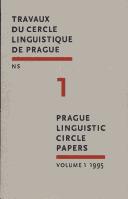
ISBN: 1283358468 9786613358462 9027276412 9789027276414 9789027276414 9781556196744 1556196741 9027254419 1556196741 9789027254412 9781283358460 6613358460 9027254427 Year: 1995 Publisher: Amsterdam : John Benjamins Pub. Co.,
Abstract | Keywords | Export | Availability | Bookmark
 Loading...
Loading...Choose an application
- Reference Manager
- EndNote
- RefWorks (Direct export to RefWorks)
This volume is the first one of the revived series of Travaux, which was the well-known international book series of the classical Prague Linguistic Circle, published in the years 1929-39. The tradition of the Circle still attracts attention in broad circles of European and American linguistics. The first volume of the new series is divided into five sections: 1. Introductory papers characterizing the development of the Prague School in the recent decades; 2. Methodological issues of structural and functional linguistics; 3. Sentence structure; 4. Discourse patterns; 5. Theory of litera
Structural linguistics. --- Functionalism (Linguistics) --- Functional analysis (Linguistics) --- Functional grammar --- Functional linguistics --- Functional-structural analysis (Linguistics) --- Grammar, Functional --- Grammatical functions --- Linguistics --- Structural linguistics --- Pražský linguistický kroužek. --- Prague Linguistic Circle --- Linguistic Circle, Prague --- Linguistický kroužek (Prague, Czechoslovakia) --- Cercle linguistique, Prague --- C.L.P. (Cercle linguistique, Prague) --- Prazhskiĭ lingvisticheskiĭ kruzhok --- CLP (Cercle linguistique, Prague) --- Prague School --- Prague (Czechoslovakia). --- Circolo linguistico di Praga --- Scuola di Praga
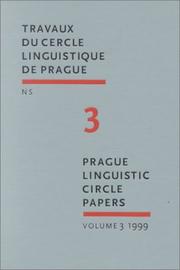
ISBN: 1283358298 9786613358295 9027275068 9789027275066 9789027275066 9781556196720 1556196725 9027254435 1556196725 9789027254436 9781283358293 6613358290 Year: 1999 Publisher: Amsterdam : John Benjamins Pub. Co.,
Abstract | Keywords | Export | Availability | Bookmark
 Loading...
Loading...Choose an application
- Reference Manager
- EndNote
- RefWorks (Direct export to RefWorks)
This volume is the third one of the revived series of Travaux, which was the well-known international book series of the classical Prague Linguistic Circle, published in the years 1929-39. The tradition of the Circle still attracts attention in broad circles of European and American linguistics.
Structural linguistics. --- Functionalism (Linguistics) --- Functional analysis (Linguistics) --- Functional grammar --- Functional linguistics --- Functional-structural analysis (Linguistics) --- Grammar, Functional --- Grammatical functions --- Linguistics --- Structural linguistics --- Pražský linguistický kroužek. --- Prague Linguistic Circle --- Linguistic Circle, Prague --- Linguistický kroužek (Prague, Czechoslovakia) --- Cercle linguistique, Prague --- C.L.P. (Cercle linguistique, Prague) --- Prazhskiĭ lingvisticheskiĭ kruzhok --- CLP (Cercle linguistique, Prague) --- Prague School --- Prague (Czechoslovakia). --- Circolo linguistico di Praga --- Scuola di Praga

ISBN: 9027215243 128323436X 9786613234360 902728248X 9789027215246 9789027282484 Year: 1987 Volume: 20 Publisher: Amsterdam Benjamins
Abstract | Keywords | Export | Availability | Bookmark
 Loading...
Loading...Choose an application
- Reference Manager
- EndNote
- RefWorks (Direct export to RefWorks)
This volume offers a variety of viewpoints on the functional approach to the study of language. After an exposition of the Prague School functionalism, and Dik's and Halliday's functional approaches, it presents a wider area of text-linguistic, psycholinguistic, sociolinguistic, theoretical, descriptive and applied issues from a functional point of view, testifying of the very wide-spread and in-depth impact of functionalist thought on the present-day linguistic scene.
Functionalism (Linguistics) --- Pražský linguistický kroužek --- Functionalism (Linguistics). --- Linguistics --- Functional analysis (Linguistics) --- Functional grammar --- Functional linguistics --- Functional-structural analysis (Linguistics) --- Grammar, Functional --- Grammatical functions --- Structural linguistics --- Prazsky linguisticky krouzek --- Prague Linguistic Circle --- Linguistic Circle, Prague --- Linguistický kroužek (Prague, Czechoslovakia) --- Cercle linguistique, Prague --- C.L.P. (Cercle linguistique, Prague) --- Prazhskiĭ lingvisticheskiĭ kruzhok --- CLP (Cercle linguistique, Prague) --- Prague School --- Prague (Czechoslovakia). --- Circolo linguistico di Praga --- Scuola di Praga --- Pražský linguistický kroužek. --- Praag (School van). (Versch. onderwerpen) --- Linguistique fonctionnelle. (Mélanges) --- Prague (Ecole de). (Mélanges) --- Taalwetenschap (Functionele). (Versch. onderwerpen) --- Prazsky linguisticky krouzek.
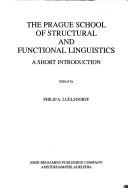
ISBN: 9027215502 1556192665 9786613327963 1283327961 9027276633 9789027215505 9789027276636 9781283327961 6613327964 Year: 1994 Volume: 41 Publisher: Amsterdam Benjamins
Abstract | Keywords | Export | Availability | Bookmark
 Loading...
Loading...Choose an application
- Reference Manager
- EndNote
- RefWorks (Direct export to RefWorks)
The importance of the Prague School for the rise of structuralism and for integration of the theoretical linguistics of today can hardly be overestimated. The volume brings together 13 papers showing the main results of the research of the Prague School and of its continuation in the domains of phonemics and written language, morphemics and word formation, lexicon, syntax and semantics, text structures, stylistics and typology. The authors all actively contributed to the domain they are treating here.
Structural linguistics --- Functionalism (Linguistics) --- Pražský linguistický kroužek --- Functionalism (Linguistics). --- Structural linguistics. --- Fonctionalisme (Linguistique) --- Functionalisme (Taalwetenschap) --- Linguistics [Structural ] --- Linguistique structurale --- Linguïstiek [Structurele ] --- Structurele linguïstiek --- Structurele taalwetenschap --- Taalwetenschap [Structurele ] --- Linguistics --- 800 --- 800 Taalwetenschap. Taalkunde. Linguistiek --- Taalwetenschap. Taalkunde. Linguistiek --- Prazsky linguisticky krouzek --- Prague Linguistic Circle --- Linguistic Circle, Prague --- Linguistický kroužek (Prague, Czechoslovakia) --- Cercle linguistique, Prague --- C.L.P. (Cercle linguistique, Prague) --- Prazhskiĭ lingvisticheskiĭ kruzhok --- CLP (Cercle linguistique, Prague) --- Prague School --- Prague (Czechoslovakia). --- Circolo linguistico di Praga --- Scuola di Praga --- Functional analysis (Linguistics) --- Functional grammar --- Functional linguistics --- Functional-structural analysis (Linguistics) --- Grammar, Functional --- Grammatical functions --- Pražský linguistický kroužek.
| Listing 1 - 10 of 13 | << page >> |
Sort by
|

 Search
Search Feedback
Feedback About UniCat
About UniCat  Help
Help News
News